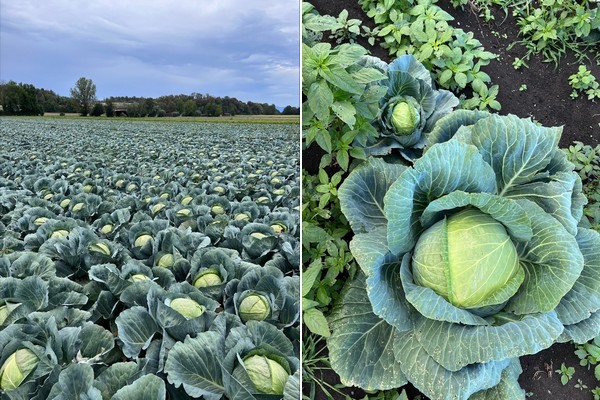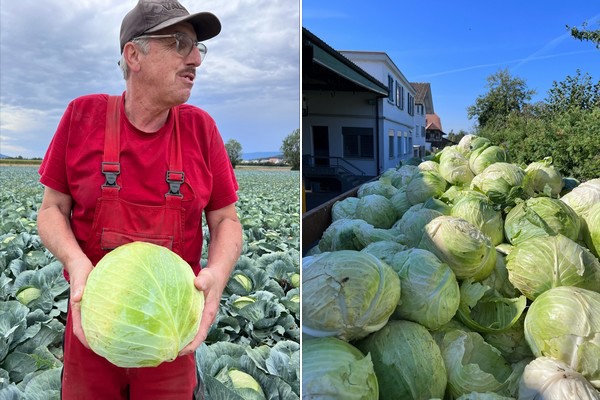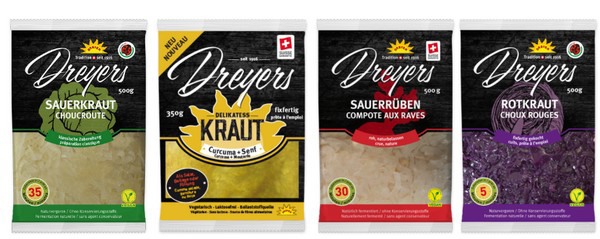Since the beginning of August, the family-owned company Dreyer AG, based in Bernese Seeland, has already been processing newly harvested white and red cabbage into sauerkraut. But the persistently high temperatures are having an impact on both regional cultivation and sales in the retail trade throughout Switzerland. "Sales are not at the level they usually are at this time of year because it's just too warm," reports David Dreyer (right), managing director of the family-owned company.
temperatures are having an impact on both regional cultivation and sales in the retail trade throughout Switzerland. "Sales are not at the level they usually are at this time of year because it's just too warm," reports David Dreyer (right), managing director of the family-owned company.
According to Dreyer, the weather has also affected regional raw availability. "We have smaller cabbages in some cases, although the internal quality of the produce has been mostly fine so far. Irrigation is definitely essential this year," says the sauerkraut specialist, pointing out that prices remain high. "Compared to last year, production costs have risen by another ten percent. Fertilizer prices have eased somewhat, but the costs for irrigation and pesticides have risen again."
Dreyer, who works exclusively with regional producers within a 50km radius, points to the climate-related problems with cabbage flies, thrips and corresponding rot. "This is increasingly causing problems for our producers. A tailored cultivation plan is now being raised, but for emergency approvals, a special permit is inevitably needed in Switzerland. Due to sluggish sales, some of the produce is left in the field. That means we have to get the filled silos empty first so we can get the remaining yields in and the produce doesn't rot in the field."
 © Dreyer AG View of the cabbage field
© Dreyer AG View of the cabbage field
Start of the sour beet season
In addition to producing and marketing red cabbage, sour cabbage and wine cabbage, Dreyer AG is also involved in processing sour beets. "We were able to harvest the first beets in mid-September. After the disastrous harvest result of last year's season, we are now satisfied with the yields and qualities. Next Monday, we will start processing and packing the first newly harvested beets, which will then soon be delivered to the retail trade. As a rule, the new sales season will then start on November 1," says Dreyer. In relation to sauerkraut, however, it is 'a smaller product mainstay'.
 Insights into this year's 'chabis harvest'
Insights into this year's 'chabis harvest'
Automation and product differentiation
Cabbage cultivation in the Bernese Seeland region maintains a long tradition, but has come under increasing pressure in recent years. Dreyer: "Two/three additional producers would be desirable. For some of our producers, the generation change is now imminent, while other farms are still looking for a sustainable succession solution." Automation of work processes is a crucial factor here, he said. "Many producers already have their own harvesting machines, and the effort involved in retrofitting has also become less labor-intensive these days, which in turn benefits clout."

As a bulk supplier, Dreyer AG primarily supplies Swiss discount markets. "In this segment of the market, there is less shelf space for new products and product innovations. Nevertheless, we created a new product line a few years ago with our delicatessen herb, which is also well received by certain groups of buyers. However, it is a niche within a niche," it concludes.
Pictures: Dreyer AG
For more information:
David Dreyer 
Dreyer AG
Frenschenbergstrasse 7
CH-2575 Gerolfingen
+41 32 396 00 00
verkauf@dreyer-ag.ch
www.dreyer-ag.ch
